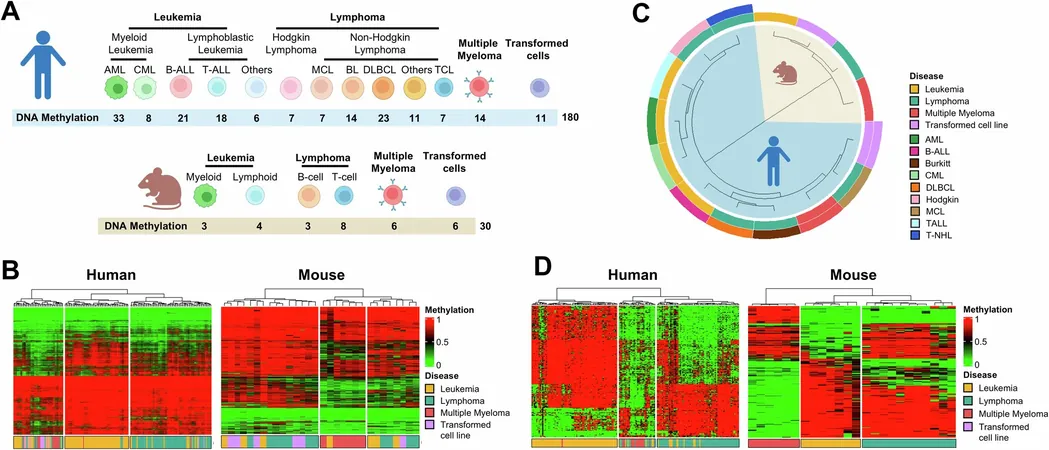
Revolutionary Epigenetic Database Set to Transform Blood Cancer Diagnosis
2024-11-26
Author: Sarah
Introduction
In a groundbreaking development in biomedical research, an innovative epigenetic database focusing on malignant cells is anticipated to revolutionize the diagnosis of blood cancer. This shift underscores a broader transformation in laboratories, where traditional test tubes have increasingly been replaced by sophisticated computer systems capable of processing vast amounts of data.
Research Overview
A recent article published in the journal Leukemia, helmed by Dr. Manel Esteller, ICREA Research Professor at the Josep Carreras Leukemia Research Institute (IJC) and Chair of Genetics at the University of Barcelona’s School of Medicine, highlights the immense potential of bioinformatics. The team unveiled epigenetic maps of over 200 cell lines linked to various malignant blood diseases, including leukemia and lymphoma. This significant advancement not only enhances our understanding of these diseases but also provides crucial tools for diagnostic accuracy.
Epigenetic Profiles
Dr. Esteller noted that their research encompasses the epigenetic profiles of the largest cultured collection of transformed cells from the bloodstream, bone marrow, and lymph nodes to date. This analysis examined more than 800,000 DNA methylation modification sites, which are critical in understanding disease progression and potential treatment pathways. The inclusion of both human and mouse samples broadens the applicability of the findings, offering insights valuable to researchers in basic, applied, and clinical settings.
Key Findings
A key takeaway from this research is the striking similarity between the newly obtained epigenomes and the primary tumors present in patients. This suggests that the database can serve as a vital reference for diagnosing blood cancers, particularly in cases where the identity or classification of the disease is uncertain. Dr. Esteller emphasized that this diagnostic approach has already shown success in identifying brain tumors and sarcomas, indicating its potential for widespread application across various malignancies.
Personalized Medicine
Moreover, the research goes beyond mere epigenetic characterization. The team has cross-referenced their findings with data on the sensitivity of more than 300 drugs, leading to the development of an algorithm capable of predicting which specific epigenetic alterations are associated with either sensitivity or resistance to treatments. This crucial milestone is expected to enhance personalized medicine approaches, allowing healthcare professionals to tailor therapies based on individual epigenetic profiles.
Public Accessibility
The comprehensive data set is now publicly accessible, housed in online repositories, ensuring that researchers and clinicians worldwide can leverage this information to improve tumor identification and therapeutic decision-making. As Dr. Aleix Noguera-Castells, the first author of the study, aptly noted, this work represents a significant advance in our ability to approach complex blood cancers with precision and informed strategies.
Conclusion
With the continued evolution of this research, the potential for better diagnostic tools and targeted therapies is not just a hope but an emerging reality that promises to save countless lives by revolutionizing how blood cancers are understood and treated.




 Brasil (PT)
Brasil (PT)
 Canada (EN)
Canada (EN)
 Chile (ES)
Chile (ES)
 España (ES)
España (ES)
 France (FR)
France (FR)
 Hong Kong (EN)
Hong Kong (EN)
 Italia (IT)
Italia (IT)
 日本 (JA)
日本 (JA)
 Magyarország (HU)
Magyarország (HU)
 Norge (NO)
Norge (NO)
 Polska (PL)
Polska (PL)
 Schweiz (DE)
Schweiz (DE)
 Singapore (EN)
Singapore (EN)
 Sverige (SV)
Sverige (SV)
 Suomi (FI)
Suomi (FI)
 Türkiye (TR)
Türkiye (TR)